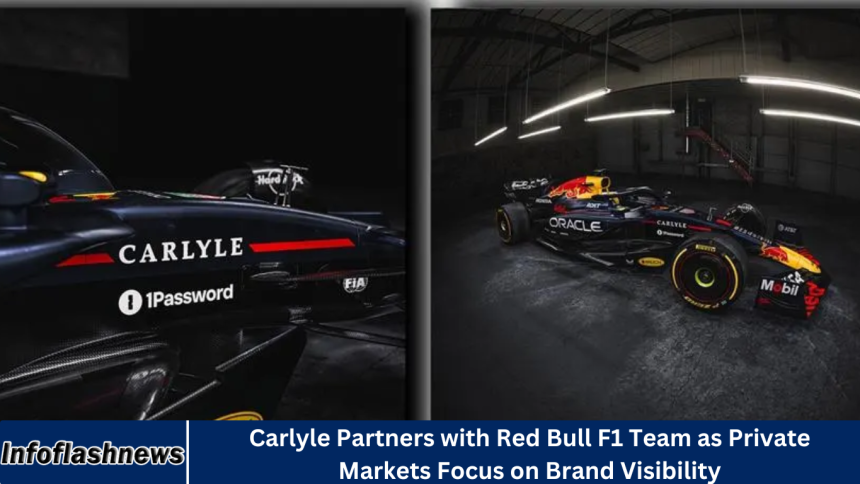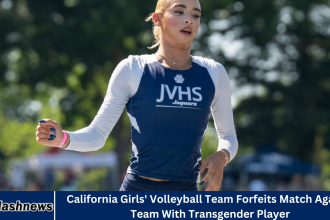The partnership between global investment firm Carlyle and the Red Bull Racing Formula 1 team marks a strategic shift in how private equity (PE) firms approach brand visibility.
As private markets mature and become more competitive, players like Carlyle are increasingly embracing high-profile marketing strategies—leveraging global platforms such as Formula 1 to build brand equity, attract top talent, and align with aspirational audiences.
This in-depth article explores the Carlyle–Red Bull F1 partnership, its implications for the private equity industry, and the growing trend of brand-building in private markets.
More Read:
1. Overview of the Carlyle–Red Bull F1 Partnership
In September 2025, The Carlyle Group, one of the world’s largest and most influential private equity firms, announced a groundbreaking partnership with Oracle Red Bull Racing, the reigning Formula 1 champions. The deal positions Carlyle as an official partner of the F1 team and integrates its branding across several digital and on-track assets.
While financial terms were not disclosed, sources familiar with the matter suggest the sponsorship deal spans multiple seasons, with options for extended collaboration in marketing, hospitality, and brand activation across global Grand Prix events.
Key Highlights of the Partnership:
-
Carlyle branding to appear on Red Bull’s F1 cars and driver suits.
-
Co-branded campaigns across social and digital platforms.
-
Executive leadership access to global hospitality events and paddock experiences.
-
Joint innovation initiatives possibly focused on sustainability and data analytics.
This collaboration is a clear brand visibility play for Carlyle—breaking away from the traditional low-profile nature of private equity.
2. Why Private Equity Firms Are Embracing Branding
Historically, private equity firms operated in the shadows, building empires through silent capital and behind-the-scenes influence. However, the competitive landscape has evolved.
Today’s PE firms are:
-
Competing for deals in a crowded market.
-
Raising funds from a more diverse set of limited partners (LPs), including retail and sovereign wealth investors.
-
Recruiting talent from an increasingly discerning global talent pool.
-
Navigating public scrutiny and regulatory pressure.
As a result, branding is no longer a luxury—it’s a strategic necessity.
The Branding Imperative for Private Markets
| Reason | Description |
|---|---|
| Increased Competition | Thousands of PE firms vying for limited deal flow. A strong brand differentiates. |
| Diversified Fundraising | Institutions and retail investors are more brand-conscious. |
| Talent Attraction | Brand reputation plays a major role in Gen Z and millennial career choices. |
| Public Accountability | As PE firms grow in influence, public perception matters more. |
3. Formula 1: The New Playground for Private Markets
The rise of Formula 1 as a global marketing powerhouse has attracted a new wave of non-traditional sponsors. Thanks to Netflix’s Drive to Survive series, F1 has gained popularity among younger audiences in the U.S., Asia, and beyond.
Why F1 Appeals to Private Equity:
-
Global Reach
Formula 1 hosts races in over 20 countries, offering Carlyle a platform to connect with clients, investors, and stakeholders across continents. -
High-Net-Worth Audience
F1’s fanbase overlaps significantly with ultra-high-net-worth individuals (UHNWIs), family offices, and institutional investors—key target audiences for PE firms. -
Innovation Alignment
F1 is synonymous with cutting-edge technology, data, and performance, mirroring the values that Carlyle promotes in its investment strategies. -
Exclusive Hospitality
F1 paddocks and VIP experiences offer intimate networking opportunities for deal-making and LP engagement.
4. Carlyle’s Strategic Objectives in Partnering with Red Bull Racing
1. Brand Awareness & Positioning
Carlyle is making a bold statement by attaching its brand to Red Bull Racing—a team known for speed, precision, and dominance. This aligns with Carlyle’s positioning as a forward-thinking, high-performance investment firm.
2. Global Outreach
With races in Singapore, the UAE, the U.S., Monaco, and more, the partnership enables Carlyle to engage with investors and portfolio companies in emerging and established markets alike.
3. Talent Magnet
Aligning with a globally recognized and aspirational brand like Red Bull Racing enhances Carlyle’s ability to recruit top-tier talent from universities, tech firms, and financial institutions.
4. Sustainability & Innovation Initiatives
Carlyle has made sustainability a core pillar of its ESG strategy. F1 is moving toward net-zero carbon emissions and exploring synthetic fuels—creating potential for co-branded ESG campaigns.
5. Brand Visibility in Private Markets: A Paradigm Shift
Carlyle’s move is not isolated. A growing number of alternative asset managers are making strategic investments in branding and sponsorship.
Examples of Branding in Private Markets:
-
Apollo Global Management partnered with the PGA Tour to offer exclusive investment access.
-
Blackstone has increased public communications and thought leadership through high-profile events.
-
TPG and KKR have both launched major brand storytelling initiatives across media.
This reflects a fundamental shift in how capital markets communicate. While hedge funds and PE firms once relied solely on returns, today’s market demands transparency, story, and social relevance.
6. Impact on the Formula 1 Ecosystem
The Carlyle–Red Bull deal also has ripple effects within the F1 sponsorship landscape. Traditionally dominated by automotive, energy, and luxury brands, the paddock now features:
-
Tech companies (Oracle, AWS, Dell)
-
Financial services (Crypto.com, HSBC)
-
Consumer goods (Heineken, Coca-Cola)
Adding private equity to the mix signals F1’s shift into more complex financial and institutional partnerships.
Benefits for Red Bull Racing:
-
Enhanced brand prestige by aligning with a top-tier financial partner.
-
Potential co-investment opportunities in motorsports innovation.
-
Broader commercial reach into the finance sector.
7. What This Means for the Future of Private Equity Marketing
Expect More Strategic Sponsorships
As PE firms chase growth in AUM, more strategic partnerships with sports, entertainment, and tech brands are likely. We may soon see:
-
PE sponsors in NFL, NBA, or European football.
-
Alternative investment ads during major events like the Super Bowl or Olympics.
-
More content-driven campaigns (e.g., documentaries, podcasts) highlighting firm values and social impact.
Marketing Budgets Will Grow
Carlyle’s partnership signals a green light for marketing spend in a sector traditionally known for frugality. Expect more:
-
Digital branding
-
Influencer collaborations (especially in fintech and VC)
-
Direct-to-investor campaigns
Frequently Asked Question
What is the Carlyle–Red Bull F1 partnership about?
The partnership involves The Carlyle Group becoming an official sponsor of Oracle Red Bull Racing, one of the leading Formula 1 teams. The deal includes brand placements, co-branded marketing campaigns, and global hospitality access—aimed at enhancing Carlyle’s visibility among investors, clients, and the public.
Why is Carlyle investing in Formula 1 sponsorship now?
Carlyle is leveraging the global reach and prestige of Formula 1 to enhance its brand recognition. With increased competition in private markets and a broader push to engage LPs and talent, Carlyle is using F1 as a strategic marketing platform to position itself as a modern, dynamic investment firm.
How does this reflect broader trends in private equity?
The deal is part of a larger trend where private equity firms are becoming more public-facing, investing in marketing, branding, and sponsorships. Firms like Carlyle, Blackstone, and Apollo are moving beyond traditional fundraising models to build emotional and aspirational connections with investors and stakeholders.
What does Carlyle gain from partnering with Red Bull Racing?
Carlyle gains:
- Global brand visibility across 20+ F1 races
- Access to Red Bull’s tech-forward, performance-driven image
- VIP hospitality and networking opportunities
- Association with a young, affluent, and international audience
- This exposure supports fundraising, recruitment, and brand differentiation.
Why is Formula 1 attractive to private equity firms?
Formula 1 offers:
- A high-net-worth, business-savvy audience
- Global reach in markets where PE firms raise and deploy capital
- A reputation for precision, innovation, and elite performance
These attributes align well with the values private equity firms want to project.
How could this partnership impact the future of private markets?
The Carlyle–Red Bull partnership could set a precedent for more PE firms entering mainstream sponsorships. It signals a shift toward transparent, public-facing strategies, and may lead to increased use of sports, media, and digital channels in private market branding.
Will other private equity firms follow Carlyle’s lead?
Yes—this move could open the floodgates for more PE firms to explore sports sponsorships, branded content, and strategic media partnerships. As competition intensifies, firms will need to stand out through storytelling, values alignment, and emotional brand engagement—something traditional finance hasn’t prioritized until now.
Conclusion
The Carlyle–Red Bull Racing partnership represents more than just a logo on a car—it’s a strategic pivot in how private markets view visibility, marketing, and brand value. As the private equity industry continues to evolve, the power of brand storytelling, visibility, and emotional connection will become just as important as IRRs and EBITDA multiples. Carlyle’s bold step into the fast-paced world of Formula 1 shows that even the most reserved sectors of finance are waking up to the modern rules of engagement.














